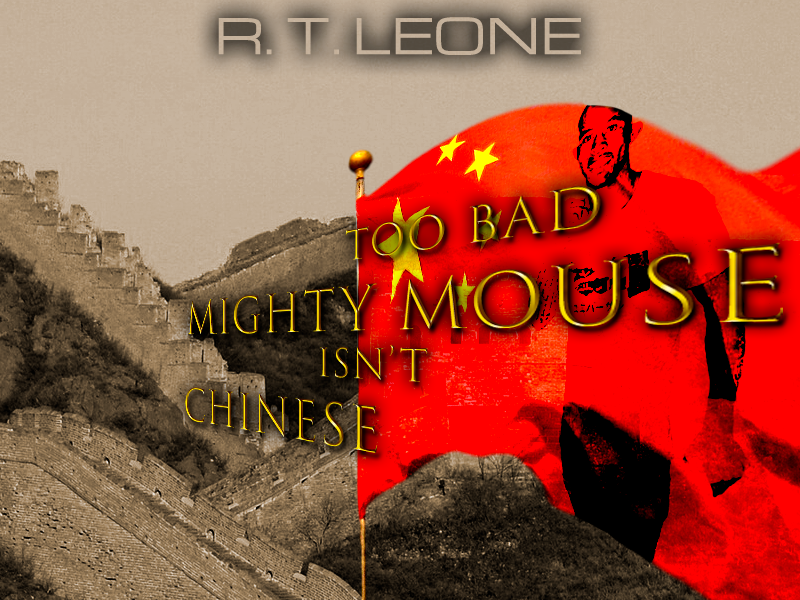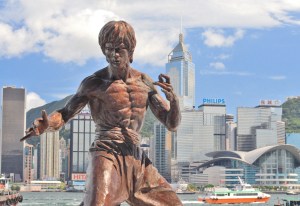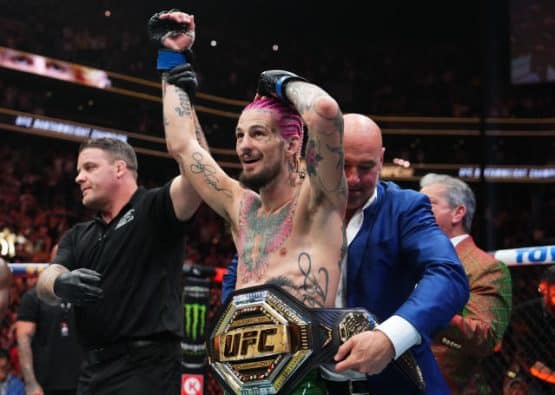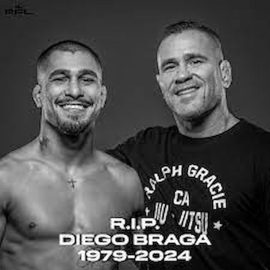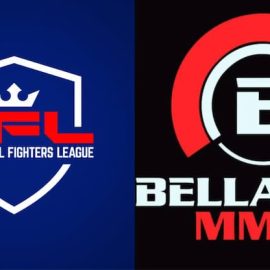
Too bad Mighty Mouse isn’t Chinese.
“Not that there’s anything wrong with that.” Except, in this case, there is.
The big story on the week of this writing is that longtime UFC Flyweight Champion, Demetrious “Mighty Mouse” Johnson, is alleging that he’s being bullied by the UFC into defending his championship against bantamweight T.J. Dillashaw, who was scheduled to fight Cody Garbrandt for the UFC Bantamweight Championship, but the bout was cancelled after Garbrandt had back issues forcing him out of their scheduled UFC 213 main event.
To summarize, Johnson won’t fight Dillashaw for the following reasons:
- Johnson is one fight away from breaking Anderson Silva’s title defense streak, which would make Johnson the champion with the most title defenses in UFC history.
- Johnson therefore wants to fight #4-ranked Ray Borg, who he claims merits the title shot more than Dillashaw—but, in reality, is a far easier fight for Johnson.
- Johnson anticipates the 135-pounder Dillashaw (who has never had weight issues) will miss weight at 125 pounds, causing their bout to not be for the UFC Flyweight Championship, and costing Johnson his opportunity to break Anderson Silva’s streak.
- Johnson, in general, resents UFC President Dana White’s pressure tactics to basically force Johnson into a fight with Dillashaw.
Of the latter, Johnson alleges that White has threatened to abolish UFC’s flyweight division (which has been suggested in the past) if he doesn’t fight Dillashaw. This, inadvertently, is more of a commentary on Johnson’s dominance as the UFC’s first and only UFC Flyweight Champion—that he has cleaned out the division and is now in a position where he must either take rematches / trilogy bouts against fighters who he has already beaten, or fight lowly-ranked contenders who have only moved up the ladder because other flyweights are losing, or are leaving the division.
In either case, there is a massive problem: nobody wants to watch a Mighty Mouse fight.
Law of (No) Attraction

Having had the lowest PPV buy rates since UFC’s rise to prominence, and doing one of UFC’s worst overnight ratings on FOX in his latest title defense against Wilson Reis, the metrics are in conflict with Johnson’s dominance as a champion. How can a guy who has had so much success inside the octagon be so conversely unsuccessful in generating interest for his fights?
The critics will point to his size, but once upon a time, the same criticism was lobbied against and dispelled by lighter weight fighters like Felix Trinidad, Oscar De La Hoya, Bernard Hopkins, Shane Mosley, Floyd Mayweather, and Manny Pacquiao—who produced record numbers in the boxing industry, and became the biggest stars of all time. More recently, size certainly hasn’t worked against Conor McGregor or Saul Alvarez either. People will watch smaller men compete, as they will with women, so long as they have a reason to.
So what’s the reason behind why Mighty Mouse isn’t a draw?
He’s too normal.
There’s nothing about Demetrious Johnson, aside from his in-cage supremacy (which unfortunately isn’t enough for the mainstream audience), that diversifies him from anyone else you see walking down the street.
Conor McGregor is a flamboyant Irishman with an entire nation of passionate fans behind him, whose brash personality connects with the target demographic (males 18-34) of the UFC, and whose confidence and success is something that transcends the sport itself—connecting him quite easily to the mainstream vis-à-vis the adoring media.
Ronda Rousey, despite a terrible personality that was only exposed (and since suppressed) on UFC’s reality series (that the mainstream doesn’t watch), became a feminist icon due to a hard marketing push by the UFC to demonstrate that women can indeed be top-tier athletes—and not only that, can allegedly defeat male fighters in actual hand-to-hand combat (according to suppositions by White and UFC shill Joe Rogan, who has since backtracked on his claims). Nonetheless, Rousey’s rise converged perfectly with the modern wave of feminism, and elevated her to mainstream success that couldn’t previously have been anticipated.
Mighty Mouse is just a normal guy. A nice guy. But a normal guy, who plays video games on Twitch because he’s trying to make supplemental income in addition to the relatively small amount he makes fighting in the UFC. But by doing so, he fails to realize that his second career diminishes the perception of him as a major superstar in the sports realm, and makes him look all-the-more normal. Normality is exactly what Johnson needs to avoid. But how can he help it?
Globalization
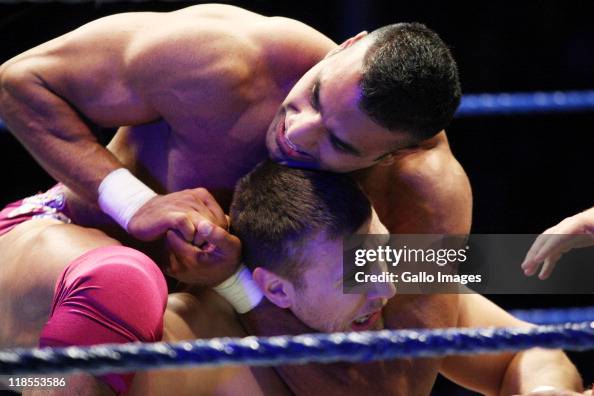
To take a drastic switch from the topic of Demetrious Johnson, and to get closer to the title of this article, I’m about to throw a name out there that some MMA fans have never heard of, while others have, and they’ll groan when they hear it again.
Jinder Mahal.
A professional wrestler who, up until two months prior, was WWE’s resident “jobber” (a wrestler whose sole purpose is to lose matches), until head honcho Vince McMahon decided on a whim that he wanted to tackle the Indian market, and combining that with Mahal’s suspicious improvement in physique, had Mahal win the promotion’s world championship in an effort to increase WWE’s presence in the Indian market, as well as attract Indian viewers across the globe.
There were 1.3 billion reasons why.
However, the challenge for the WWE is that there is such an income gap in India between the wealthy and the poor, and you guessed it, professional wrestling typically appeals to the working class, who would be hard-pressed to subscribe to the WWE Network and buy WWE merchandise when basic necessities like food, shelter, and clean water are an ongoing struggle.
China has similar issues in certain rural areas of the nation, but is nonetheless booming as the business epicenter of the world with its thriving metropolises. With a similar rounded population figure of 1.4 billion people, and a rising presence in global media, China is an extremely attractive market for any American content producer. This was primarily why WWE otherwise randomly signed an unknown Chinese wrestler named Bin Wang last year.
So why wouldn’t UFC follow in WWE’s footsteps and likewise pick a Chinese fighter to develop into their next big superstar?
Because they don’t have one.
In their quest for “World F*cking Domination,” UFC actually tried this experiment four years ago by taking their reality show to China as a talent search to find a native fighter who the promotion could build their Chinese expansion around. What they found was a slew of undeveloped mixed martial artists who would’ve needed several years to catch up to the standards of American MMA. They used Vietnamese Cung Le as an initial anchor superstar in China, but there was an issue: Cung Le isn’t Chinese. Moreover, he was finished by Michael Bisping in Macau, China, was suspended by the UFC for a faulty drug test failure, demanded his release from the UFC, and then subsequently joined a class action lawsuit against them.
What was left was just as big of a void in China’s nonexistent demand of MMA than there was before the UFC tried to fill it.
WANTED: Bruce Lee
Above were explanations of why Conor McGregor and Ronda Rousey have gained mainstream success, while Demetrious Johnson has not. Here’s a description of the superstar UFC needs in order to break into the coveted Chinese market:
___________________________ is a mixed martial artist who is UFC’s first and only flyweight champion, having defended his title ten times. His speed, conditioning, and dynamic fighting style is an exciting display of what mixed martial arts has to offer, and his repeated success inside the octagon has elevated him to become one of the greatest fighters in the sport’s history. Since he has cleaned out his division, analysts predict he will move up in weight to challenge the bantamweight champion, furthering his history-making achievements.
Too bad Mighty Mouse isn’t Chinese. Therefore, we can’t apply the following paragraph:
As a result of his dominance in addition to his Chinese heritage, ___________________________ has become a national sensation in China, having appeared in numerous films, television shows, and commercials, and has therefore opened up the entire sport of mixed martial arts to Chinese viewers who were previously unfamiliar with the sport, causing the popularity of MMA to explode on the world stage, and doubling the market size of the industry.
This is exactly what the UFC would want. And if, hypothetically, Johnson was Chinese, there would be no doubt that he would be getting a far stronger marketing push than he’s receiving now.
But this isn’t necessarily an indictment on the UFC. The truth is, from a completely pragmatic sense, it’s entirely possible that they see marketing dollars on Johnson as wasted money, since no matter how much money they spend promoting him, his personality is such that he won’t connect with the mainstream regardless. It’s not negligence or discrimination, it’s merely the business reality of the circumstance.
In an alternate universe, Demetrious Johnson is Chinese (or Indian), and he would’ve gotten the hard push that Mexican featherweight Yair Rodriguez was about to get had he not been pummeled by Frankie Edgar. Being of the same nationality as an emerging market is, in and of itself, a unique identifier attractive to a corporation bent on easy global expansion—like the UFC.
And to push it further towards a utopic fantasy, the UFC would fill in the above blank with “Bruce Lee,” as far as a Chinese athlete with his own unique martial arts style, and whose look and persona would appeal directly to the American audience through Hollywood. In such a case, the company most certainly wouldn’t see advertising as poor expenditure, as their efforts in marketing cosmetic princess and perennial gatekeeper Paige VanZant over strawweight queen Joanna Jędrzejczyk have clearly demonstrated.
The African-American Market?

UFC Light Heavyweight Champion, Daniel Cormier, recently said something very thought-provoking in relation to the UFC-Demetrious Johnson debacle.
“One: he’s small, okay. Honestly, as African-Americans, you have to market people differently. There is a different demographic, and I don’t know if DJ really fits neatly into any certain one, because of just his family and everything; everything combined, you gotta get tricky when marketing a small guy, especially an African-American guy. So, the UFC doesn’t really know how to do that yet with him.” – Daniel Cormier
Cormier’s assertion that Johnson does indeed fit into a “group,” and thereby, represents a visible minority that could be marketed to is absolutely correct on the surface. However, digging deeper, this is actually the one exception to the rule that, inadvertently, hurts Johnson in this case.
Since legendary boxer Jack Johnson’s transcendence of the color bar in the early twentieth century, and doing wonders for the perception of black people as equivalent athletes with his defeat of the (white) World Heavyweight Champion James Jeffries, combat sports have since typically been ahead of the curve as far as minimizing, if not eliminating completely, racial barriers in the perception of the audience.
Therefore, to that same audience, Demetrious Johnson isn’t in an isolated group called the “African-Americans.” He’s just an American, as previous champions Maurice Smith, Kevin Randleman, Quinton Jackson, Rashad Evans, Jon Jones, and Benson Henderson were, and just as Daniel Cormier and Tyron Woodley are now. But since Americans have historically held the most UFC titles (and currently, five of the seven male UFC champions are of U.S. nationality), there needs to be an attraction beyond that, and it’s not a problem necessarily limited to Johnson, but something that every champion not named Conor McGregor faces right now.
If a Tree Falls in a Forest…

So what’s the fix? If Mighty Mouse doesn’t appeal to any desired market, has personality woes that anchor him further, and is now finding himself at odds with his employer for refusing to fight an undesired opponent, does it just become easier for the UFC to have Johnson finish out his contract, release him, and close the flyweight division as they apparently desire? Or, despite his shortcomings, is there a way to make Johnson a superstar regardless?
Historically, Ric Flair’s famous line, “To be the man, you’ve got to beat the man,” has been true in combat sports. Mayweather didn’t become a superstar until he defeated previous megastar, De La Hoya. Same for Pacquiao. Tito Ortiz needed to beat Ken Shamrock to get “the rub” as a draw, and then Chuck Liddell beat Ortiz to gain his own fame. Then, they repeated this process again with the same three fighters in 2006, leading to UFC’s first one-million pay-per-view buyrate between Ortiz and Liddell—all rooted from Shamrock’s popularity he developed while in professional wrestling.
Johnson needs to fight, and defeat, an established draw to gain a following that will last in subsequent bouts (and developing a mainstream-friendly personality will determine if he can maintain that following). The issue is, there’s no draw in sight. Dillashaw is a former champion, and a win over him would elevate Johnson in the eyes of the hardcore audience, but they already know who he is and respect him for it. It’s the casual audience Johnson needs to impress.
He knows this. Johnson stated after the Reis fight, as silly as it seemed, that he wanted to fight middleweight Chael Sonnen or featherweight McGregor so he can realize his goal of making seven figures for a one-off big money bout. The bigger value is actually attracting the eyeballs that those fighters would bring due to their outspoken personalities and pre-established star power, because that’s what would help Johnson’s long-term drawing power in subsequent bouts.
The silliness comes from the fact that Sonnen is fighting for rival Bellator, McGregor has a waiting list of fighters in his own division as he pursues a boxing bout with Floyd Mayweather, and Johnson himself has zero power to leverage the UFC and an athletic commission in sanctioning such drastic open weight bouts. Johnson would rather benefit from learning what those athletes did to make themselves superstars.
By the same token, if Johnson doesn’t have it, then he doesn’t have it. Likewise, since he hasn’t done so already, if he doesn’t feel up to putting on a performance or turning up the volume on his personality to elevate his star power, then he probably won’t. Ironically, this latest controversy with Johnson refusing to fight Dillashaw has been the most mainstream attention Johnson has ever gotten, and if that fight does formalize, it’ll likely do better than all of Johnson’s previous bouts because of the controversy (and temporary barrier) itself.
As history has repeatedly shown, no pound-for-pound great is impervious to losing eventually, and if that happens to Johnson, the problem of his lacking to attract an audience will solve itself. If he continues to win, and ends up retiring without suffering another loss while continuously failing to draw, Johnson will be an interesting (and slightly tragic) case study of an athlete who was the best in the world at his weight class, but since he failed to be a superstar, didn’t reap the benefits that such a talented fighter should’ve at a time other fighters were making tens of millions of dollars within the same promotion.
Mighty Mouse’s next moves and career choices will have far-reaching consequences; not just for the future of the flyweight division (and whether it’ll even exist), but particularly for how he will be remembered. It’s now up to him to write his own legacy.
Will he make a sound?
Ricky Leone is an author and essayist for the MMA Manifesto on TheSportsDaily.com. If you enjoyed this piece, please be sure to check out his new novel, Invinciman, on Amazon.
Or, better yet, grab a copy of it via this handy link:
[protected-iframe id=”fa6450cf05fc060ff2b74a63ec865253-114320562-9927038″ info=”//ws-na.amazon-adsystem.com/widgets/q?ServiceVersion=20070822&OneJS=1&Operation=GetAdHtml&MarketPlace=US&source=ss&ref=as_ss_li_til&ad_type=product_link&tracking_id=thehooman01-20&marketplace=amazon®ion=US&placement=B06XJ1BZY1&asins=B06XJ1BZY1&linkId=68eb999e99415b2f748f72d3fd659d8a&show_border=true&link_opens_in_new_window=true” width=”300″ height=”150″ frameborder=”0″ style=”width: 120px; height: 240px;” scrolling=”no”]Add The Sports Daily to your Google News Feed!
